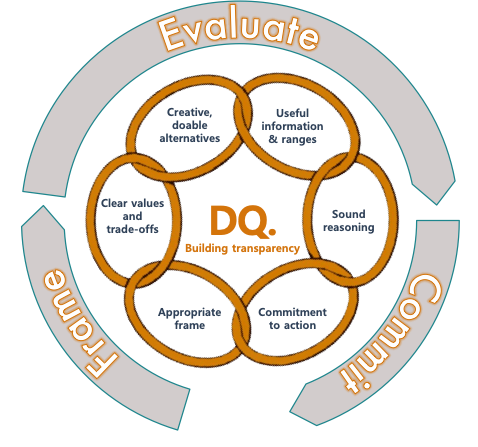About
Making good quality decisions requires practice. It requires combining the science of decision analysis with the art of dealing with people. It is more than gut feel. It is more than a skill.
It is a craft. DecisionQraft.
DecisionQraft - the Company
DecisionQraft is about crafting quality decisions – better decisions for an uncertain world.
We like good outcomes. We even like to be lucky, at times. And we often attribute good outcomes to skill. Even when good luck was involved.
We don’t like bad outcomes. We don’t like to be unlucky, normally. And so we often attribute bad outcomes to bad luck. “That is rotten luck, that is!”. And funny enough we don’t question our skill in decision making.
It is tempting to define a good decision as one with a good outcome. But it is not helpful. In an uncertain world, outcomes are created by a combination of our actions and chance. To get better at decision making, to increase the likelihood of better outcomes, we need to look at how we make decisions before we know the outcomes.
The good news is: the quality of a decision can be assessed when making the decision. Robustly. Before we know the outcome. A good quality decision is not guaranteed to give a good outcome (the world is uncertain, after all). But it certainly raises the likelihood. You stack the deck in your favour.
Decision Quality - the Concept
Making good decisions is a skill that can be learned. That is the good news. The basics are in fact very simple. Good quality decisions need in essence six elements.
A decision frame. What are we deciding now? And what not?
Alternatives to choose from. No alternative, no decision!
What is your objective? What do you value?
What information do you have? What do you know, and what don’t you know?
Is your decision logic sound? Do you have a story that makes sense?
And finally, can you commit to action? Do you have the resources to act?
Common practice is to put these elements in a chain. If one element is broken, the chain is broken.
Decision Quality in Practice
The DQ chain is deceptively simple. But a consistent application is hard. I have seen many broken chains, involving any and all links. To name a few:
Worrying too much about detail, or staying at too high a level
Not being creative about alternatives, defaulting to a “do nothing” choice
Missing key values. Not being able to formulate trade-offs. Wanting everything
Biased views. Inability to identify uncertainty, inability to value information
Gut feel and logic do not align, without questioning why
Wanting it – but not having the money or people to act on it
Therefore good quality decisions require practice. They require combining the science of decision analysis with the art of dealing with people. It is more than gut feel. It is more than a skill. It is a craft.
Work with me
Facilitation, coaching, integrating across disciplines – these are my key skills. And I apply them to Decision Quality, Uncertainty Management, Value of Information – these are my passions.
Bringing DQ skills into your organisation will bring more transparency, more clarity, and less ad-hoc decision making. When you need capability to navigate your projects in a complex and uncertain world - contact me.
My 30 years of industry experience is from the upstream energy business. Yet the concepts above are transferable to any business. In fact, they are transferable to private life – I see Decision Quality skills as a life skill, as much as a business skill. If you are an educator, and interested in applying this in your school - contact me.
Better decisions for an uncertain world.



